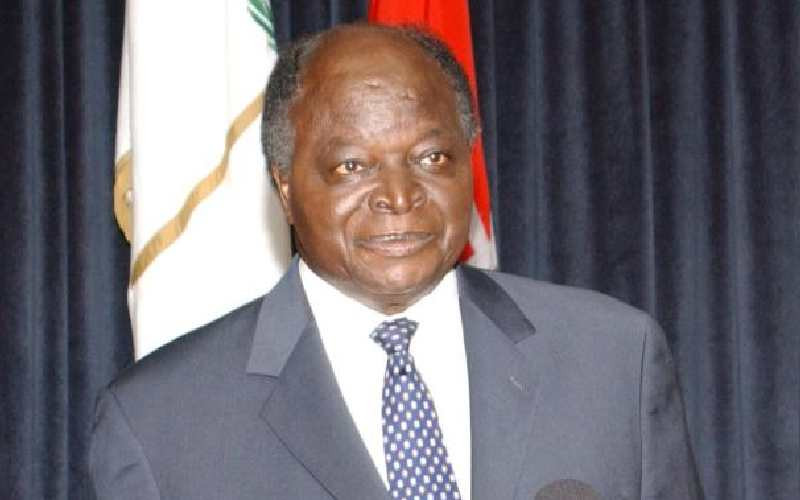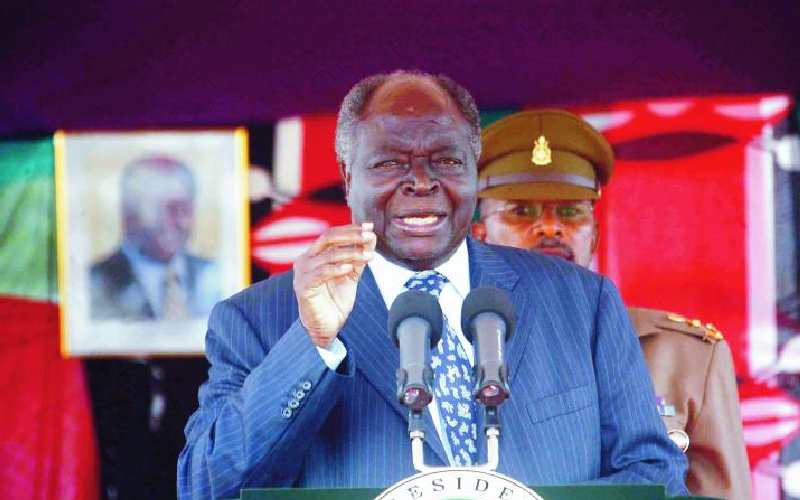
In our continuing book serialisation, author Oduor Ong'wen revisits the two controversial 2002 MoUs that drove a wedge between the Kibaki and the Raila side of the NARC government
The moment was euphoric. The feeling was ecstatic and the feel-good mood was written over the faces of many a Kenyan - and a few friends of Kenya who were here to savour the moment.
Kanu's four-decade stranglehold on the levers of the State had finally been loosened, or had it? Even though the day of Independence found me around, was too young to appreciate its meaning and how Kenyans felt and behaved. Narc's victory over the party of Independence was historic in many aspects.
First, what had become unimaginable for Kenyans, namely the spectre of President Moi ceding authority in deference to the constitutional provision of a maximum two-five-year term limit had actually happened. It was unbelievable but real. Tears flowed freely from the eyes of Moi loyalists. Tears of joy similarly flowed unrestrained from the teargas-hardened eyes of those who had fought so hard for this day.
Second, having in the two preceding elections demonstrated their inability to forge a common front against the incumbent, a united opposition had finally coalesced into a grand alliance and provided an undivided challenge to the ruling party and President Moi's preferred successor.
Third. for the first and so far the only time, the results were called such media tallying and real-time broadcasting. I was representing Narc out by the media and the main challenger conceded defeat at the tallying centre at the County Hall. It was we who alerted the Electoral Commission of Kenya chairman Samuel Kivuitu, when the threshold had been passed and the Kanu candidate, Uhuru Kenyatta, had convened a press conference to concede the election and congratulate the President-elect.
Fourth, the man of the moment, Mwai Kibaki, was described as a person of "integrity and efficiency". The media had often referred to him as being of a "gentlemanly mien'. Everyone was anxious to heap accolades on Kibaki. But there was at least one notable dissenting voice from the soldiers of the 'Second Liberation'.
That voice belonged to James Orengo. When we could not give him a hearing, Orengo decided to throw his hat in the ring for the presidential contest. Kenyans largely ignored him but his point was registered. He was emphatic that Kibaki was not the political solution Kenyans were looking for - and time later proved him right.
- When shopping for your home on Facebook
- Empress Ciku Kimani set to launch fifth book at age 50
- Cocktails, connections, and creativity: Ciku's book launch promises magic
Keep Reading
There was great optimism about the possibilities of a new mode of political engagement in the country. Gallup International polled Kenyans as the most optimistic people on earth. President Kibaki's inaugural speech inspired more optimism. He promised to employ human rights-based approaches to governance; reverse the economic decline; deal firmly with corruption; and respect systems and institutions. He told Kenyans that the era of roadside declarations had come to an end.
Progressive Kenya
That he had as his political generals such renowned veterans of the 'Second Liberation as Raila, Nyong'o, Murungi and Kituyi made many Kenyans dare to dream of a new progressive Kenya. The civil society, my constituency, welcomed -- even if cautiously -- the inclusion of a number from its ranks in the new government.
These included Murungi, Kibwana and Mirugi Kariuki, among others. Deployment of the likes Gibson Kamau Kuria as lead counsel in the Goldenberg Commission of Inquiry, the appointment of Maina Kiai as the chair of the Kenya National Commission on Human Rights (KNCHR) and the tapping of Makau Mutua to head a task force to look into the need for establishing a Truth, Justice and Reconciliation Commission sent positive vibes to the civil society.
The appointment of John Githongo, then head of Transparency International in Kenya, as the Permanent Secretary for Ethics and Governance, raised the optimism a notch higher. The Narc government appeared to be adopting the civil society as its hunting ground for technocrats with such aggression that as chair of NGOs Council, I had to convene a meeting to discuss the strategic engagement between CSOs and the new government lest we be co-opted ala Kenyan labour movement in the post-independence dispensation or the South African CSOs at the end of apartheid. The meeting took place in Nanyuki at Sportsman's Arms Hotel.

President Mwai Kibaki at St Pauls High School Kevote when the school celebrated its golden jubilee. [George Mulala, Standard]
One of the first and most significant pointers to Kenyans not to expect President Kibaki to keep pre-election promises was his trashing of the MoU signed between the National Alliance of Kenya (NAK) and the Liberal Democratic Party (LDP). As a pre-election grand coalition-building effort, NAK and LDP supported by a number of smaller parties, had agreed on both a political programme and a power-sharing formula.
They, therefore, ended up with two MoUs. One, an elaborate MoU outlining policy commitments and key principles of forming the post-Moi government, which was read out to the public at Hilton Hotel on October 2002.
The other, detailing a power-sharing arrangement for the two parties, was signed by the Summit of the hitherto presidential contenders at Nairobi Club and detailed the structure of government and how Cabinet positions would be shared by the two sides.
The Hilton document was read in the full view of Kenyans while the Nairobi Club one was read in the full view of members of the Summit in the meeting rooms of the Club and deposited with lawyer Ambrose Rachier.
The latter agreement was not made public. It is through the MoUs that the National Rainbow Coalition was born. Both documents were regarded as being part of the same deal and were collectively referred to as the MoU.
The MoU was the glue that bound the NARC coalition together and facilitated electoral victory over Kanu.
Eight slots
Some of the key provisions of the MoU were sharing positions in the government on a 50:50 basis, and creation of the position of Prime Minister, which would go to LDP. In his Cabinet of 23, Kibaki appointed 15 ministers from his NAK wing and gave LDP eight slots only. To rub salt into a gaping wound, most of the eight persons appointed from the LDP were not nominated by the party but were said to be dyed-in-the-wool NAK supporters.
Of course, the Prime Minister's position was not created. Kibaki and his allies argued that to create this position would be tantamount to establishing two centres of power, which they averred to be a recipe for instability. The greatest paradox is that it was the same individuals, including Kibaki and Murungi, who had as opposition leaders rooted for the creation of this position in order to disperse powers of what they called 'imperial presidency".
True to his reputation, it was minister John Michuki who let the cat out of the bag. As reported in The Standard of September 18, 2003, Michuki, while addressing a rally in his Central Kenya backyard, told the people that they had proposed the creation of the premiership so that "one of our own could share power with Moi". Now that Moi was gone, he reasoned, there was no need for power to be dispersed because unlike Moi, Kibaki was a good president.
Feeling betrayed by this turn of events, 25 LDP legislators led by Mbita MP Otieno Kajwang' issued a statement to declare that "unless the President honoured the MoU on appointments, the tenets on which Narc was founded will be betrayed".
In contradiction to his inaugural speech that Kenyans had interpreted and praised as spelling doom for the culture of patronage politics, cronyism, rent-seeking, kleptocracy and the Big Man syndrome as he declared that the era of one-man rule was over and the politics of roadside declarations was now past, President Kibaki cast aside the Narc Summit, a body meant to facilitate consultative governance and check one-man rule.
His new regime quickly acquired an ethnic character. This became manifest when he appointed his Cabinet and top public servants, including those in the parastatals. It was noted that he did this without consulting any of NARC's top leaders.
Instead, it was said that a cabal comprising Joe Wanjui, George Muhoho and Nat Kang'ethe had either been tasked or arrogated themselves the role of vetting top appointments for the new administration. Soon, there was disquiet even within the NAK side of the coalition, with accusations flying that the Democratic Party section had hijacked the government. Indeed, there were murmurs that GEMA had replaced KAMATUSA (Kalenjin, Maasai, Turkana and Samburu) as power barons. It was, indeed, politics as usual.
Another pointer that the Kibaki administration was not going to midwife a departure from those the Kenyatta and Moi eras before him was the character of his key appointees. Nearly all of them had previous and not very glorious official experience with the Kanu government in critical dockets. Going by what the country had experienced under the two previous regimes, the appointments inspired little optimism.
The reform enthusiasts were alarmed that President Kibaki's first batch of permanent secretaries included six former key Kanu top movers. These included a former notorious police officer, Jeremiah Matagaro, former provincial commissioner Zachary Ogongo, former district commissioner Dave Mwangi, two former permanent secretaries Karega Mutahi and Erastus Mwongera, and a former Secretary to the Teachers Service Commission, Benjamin Sogomo.
In analysing the new appointments, we failed to discern any distinguished service this sextet and others had rendered that made their inclusion in a transformative team unavoidable. Francis Muthaura, an old hand who rose through the ranks from a district commissioner to a permanent secretary in the two preceding regimes of Jomo and Moi, was appointed to head the public service.
Through his appointment of the Cabinet, top civil servants and heads of state corporations, President Kibaki deliberately blended the Kenyatta "family" with Moi's 'extended family'. Muhoho, Kenyatta's brother-in-law, had served a long spell as Juja MP and Moi's minister for Tourism and Wildlife. Kibaki appointed him as the Managing Director and chief executive of the Kenya Airports Authority.
Michuki was a notorious administrator in the colonial era, nicknamed kimendero (crusher), because he was alleged to have specialised in crushing the genitals of Mau Mau activists. He served as a permanent secretary under Jomo and MP and assistant minister in the Moi regime. Matere Keriri was another carry-over straddling all seasons. Kibaki named him Comptroller of State House.
These initial appointments were a clear indicator to pro-reform activists of the direction President Kibaki had chosen to steer the country. It did not, therefore, surprise us when within two years: Kanu legislators were incorporated into the 'Government of National Unity'. The co-optation of Ford People's Simeon Nyachae's well as Njenga Karume and John Koech of Kanu was a clear signal that President Kibaki had indeed engaged the reverse political gear.
A casual observer would have dismissed this recycling of top Kanu influence peddlers as only an urge to satisfy nostalgia and reward members of the old boy network. Nothing could be farther from the truth. It was a deliberate scheme to forge an alliance between the Moi era wheeler-dealers and key members of the Kibaki administration.
Stronger Than Faith: My Journey in the Quest for Justice
Genre: Autography
Author: Oduor Ong'wen
Publisher: Vita Books, 2022
Copyright 2022, Oduor Ong'wen
Availability: Distributed by African Books Collective (ABC)
 The Standard Group Plc is a multi-media organization with investments in media platforms spanning newspaper print
operations, television, radio broadcasting, digital and online services. The Standard Group is recognized as a
leading multi-media house in Kenya with a key influence in matters of national and international interest.
The Standard Group Plc is a multi-media organization with investments in media platforms spanning newspaper print
operations, television, radio broadcasting, digital and online services. The Standard Group is recognized as a
leading multi-media house in Kenya with a key influence in matters of national and international interest.

